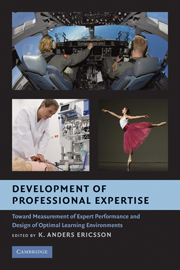 Development of Professional Expertise
Development of Professional Expertise Book contents
- Frontmatter
- Contents
- List of Figures
- List of Tables
- List of Contributors
- 1 The Measurement and Development of Professional Performance: An Introduction to the Topic and a Background to the Design and Origin of This Book
- SECTION 1 CHALLENGES IN PAST AND CONTEMPORARY EFFORTS TO MEASURE AND TRAIN THE OBJECTIVE PERFORMANCE OF PROFESSIONALS
- SECTION 2 PAST AND CONTEMPORARY EFFORTS TO DESIGN INSTRUCTION, TRAIN, AND MAINTAIN PROFESSIONAL PERFORMANCE
- SECTION 3 THE ASSESSMENT AND TRAINING OF SKILLED AND EXPERT PERFORMERS IN THE MILITARY
- 10 Toward a Second Training Revolution: Promise and Pitfalls of Digital Experiential Learning
- 11 Evaluating Pilot Performance
- 12 Contrasting Submarine Specialty Training: Sonar and Fire Control
- 13 Training Complex Cognitive Skills: A Theme-Based Approach to the Development of Battlefield Skills
- 14 Structuring the Conditions of Training to Achieve Elite Performance: Reflections on Elite Training Programs and Related Themes in Chapters 10–13
- SECTION 4 THE DEVELOPMENT OF EXPERTISE AND EXPERT PERFORMANCE
- Name Index
- Subject Index
- References
14 - Structuring the Conditions of Training to Achieve Elite Performance: Reflections on Elite Training Programs and Related Themes in Chapters 10–13
Published online by Cambridge University Press: 04 August 2010
- Frontmatter
- Contents
- List of Figures
- List of Tables
- List of Contributors
- 1 The Measurement and Development of Professional Performance: An Introduction to the Topic and a Background to the Design and Origin of This Book
- SECTION 1 CHALLENGES IN PAST AND CONTEMPORARY EFFORTS TO MEASURE AND TRAIN THE OBJECTIVE PERFORMANCE OF PROFESSIONALS
- SECTION 2 PAST AND CONTEMPORARY EFFORTS TO DESIGN INSTRUCTION, TRAIN, AND MAINTAIN PROFESSIONAL PERFORMANCE
- SECTION 3 THE ASSESSMENT AND TRAINING OF SKILLED AND EXPERT PERFORMERS IN THE MILITARY
- 10 Toward a Second Training Revolution: Promise and Pitfalls of Digital Experiential Learning
- 11 Evaluating Pilot Performance
- 12 Contrasting Submarine Specialty Training: Sonar and Fire Control
- 13 Training Complex Cognitive Skills: A Theme-Based Approach to the Development of Battlefield Skills
- 14 Structuring the Conditions of Training to Achieve Elite Performance: Reflections on Elite Training Programs and Related Themes in Chapters 10–13
- SECTION 4 THE DEVELOPMENT OF EXPERTISE AND EXPERT PERFORMANCE
- Name Index
- Subject Index
- References
Summary
There can be arguments as to what training revolution we are in the midst of currently (Chatham, Chapters 2 and 10; Hunt, Chapter 5), but what does not seem debatable is that our society now confronts social, technological, and cultural conditions that require a revolution in training. Personnel in industry, health, military, and the public sector have more to learn in less time. Increasingly sophisticated and rapidly changing electronic and other technologies impose additional training demands at the same time that they offer the potential to make training more effective and more portable. The chapters in this section focus on these problems from the perspective of the military, which has always tried to be at the cutting edge of research and knowledge of learning and mastery. The United States Army, for example, requested that the National Academy of Sciences commission a National Research Council Committee study on the techniques for the enhancement of human performance (Druckman & Bjork, 1991, 1994; Druckman & Swets, 1988).
From the perspective of the military, changes in technology, types of wars, and the social/cultural contexts of warfare require that training must continue after military personnel are deployed, including in combat zones. Such changes also require that an elite performer possess a high level of interpersonal and cultural skills and sensitivities, as well as a high level of traditional warfighter skills. To optimize training, given these changes and challenges, requires new perspectives and new technologies, as well as capitalizing on progress in the science of learning.
- Type
- Chapter
- Information
- Development of Professional ExpertiseToward Measurement of Expert Performance and Design of Optimal Learning Environments, pp. 312 - 330Publisher: Cambridge University PressPrint publication year: 2009
References
- 11
- Cited by
